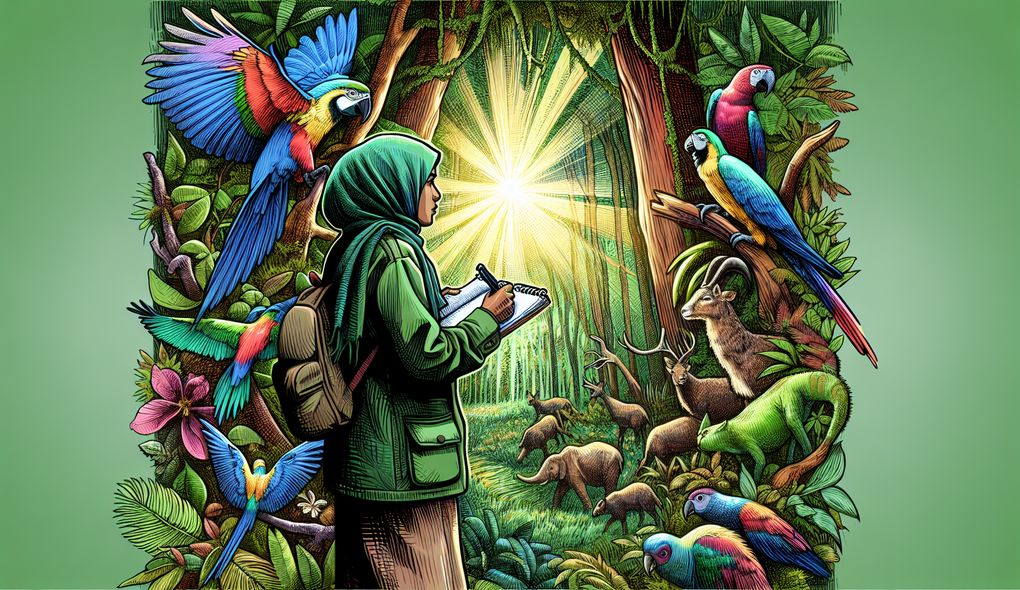How do you stay updated on the latest developments in wildlife biology and conservation?
SENIOR LEVEL

Sample answer to the question:
To stay updated on the latest developments in wildlife biology and conservation, I regularly participate in conferences, workshops, and seminars related to my field. I also subscribe to scientific journals and publications in wildlife biology and conservation, where I can read about the latest research findings and advancements. Additionally, I am an active member of professional organizations and networking groups, which provide me with opportunities to connect with other experts in the field and exchange knowledge. Furthermore, I make use of online resources such as websites, blogs, and forums dedicated to wildlife biology and conservation to stay informed about current trends and discussions.
Here is a more solid answer:
To stay updated on the latest developments in wildlife biology and conservation, I employ a multi-faceted approach. Firstly, I regularly attend national and international conferences, where I not only listen to presentations by leading researchers but also actively participate in panel discussions and workshops. These events provide me with insights into cutting-edge research, innovative methodologies, and emerging trends in the field. Secondly, I am an avid reader of scientific journals and publications, keeping up with the newest research findings, advancements, and debates. I make sure to critically analyze and interpret the data presented, enhancing my understanding and analytical abilities. Additionally, I actively engage with online communities dedicated to wildlife biology and conservation, such as forums and social media groups. Here, I contribute to discussions, share resources and insights, and learn from the experiences of fellow professionals. Lastly, I maintain strong connections with colleagues and mentors in the field, regularly discussing ongoing projects, exchanging knowledge, and collaborating on research endeavors.
Why is this a more solid answer?
The solid answer provides more specific details about how the candidate stays updated on the latest developments in wildlife biology and conservation. They mention attending conferences, actively participating in panel discussions and workshops, and critically analyzing research publications. They also highlight their active engagement with online communities and maintaining connections with colleagues and mentors in the field. This demonstrates their proactive approach to continuous learning and staying abreast of advancements.
An example of a exceptional answer:
My commitment to staying updated on the latest developments in wildlife biology and conservation is evident through my comprehensive approach. Firstly, I maintain memberships in professional organizations, such as the Wildlife Society and the Society for Conservation Biology, actively participating in their conferences, webinars, and workshops. Through these platforms, I engage with renowned experts, exchange ideas, and learn about state-of-the-art techniques and research breakthroughs. Additionally, I have developed a strong network of collaborators and mentors who share similar research interests. We regularly organize virtual journal clubs and research discussions to critically analyze recent publications, challenge each other's perspectives, and foster intellectual growth. Moreover, in order to expand my knowledge beyond academia, I actively seek opportunities to collaborate with government agencies, NGOs, and local communities. These partnerships enable me to gain practical insights into conservation initiatives, understand real-world challenges, and contribute to evidence-based decision-making. Lastly, I leverage technological tools like GIS and remote sensing, constantly updating my skills and staying informed about the latest applications and advancements in spatial analysis and monitoring.
Why is this an exceptional answer?
The exceptional answer builds upon the solid answer by providing even more specific details about the candidate's proactive approach to staying updated in the field. They mention specific professional organizations they belong to and the activities they participate in, showcasing their active engagement and desire to learn from renowned experts. They also highlight the importance of collaboration and expanding knowledge beyond academia. Additionally, they emphasize their utilization of technological tools like GIS and remote sensing, demonstrating their commitment to enhancing their technical skills. Overall, the exceptional answer demonstrates a comprehensive and strategic approach to staying updated on the latest developments in wildlife biology and conservation.
How to prepare for this question:
- Research and familiarize yourself with the leading professional organizations and conferences in the field of wildlife biology and conservation. Join relevant organizations and make note of upcoming conferences and events.
- Subscribe to reputable scientific journals and publications in wildlife biology and conservation. Read and critically analyze the research articles and stay updated on the current research trends and findings.
- Engage with online communities dedicated to wildlife biology and conservation. Participate in discussions, share resources, and learn from the experiences of fellow professionals.
- Establish connections with colleagues, mentors, and experts in the field. Attend networking events, seek opportunities for collaboration, and regularly engage in research discussions and knowledge exchange.
- Stay updated on technological advancements in GIS and remote sensing tools. Explore online courses, webinars, and workshops to enhance your technical skills in these areas.
What are interviewers evaluating with this question?
- Advanced research and fieldwork skills
- Expertise in wildlife and ecological conservation principles
- Strong leadership and project management abilities
- Excellent communication and collaboration skills
- Proficiency in GIS and remote sensing tools
- Ability to analyze and interpret complex data sets

